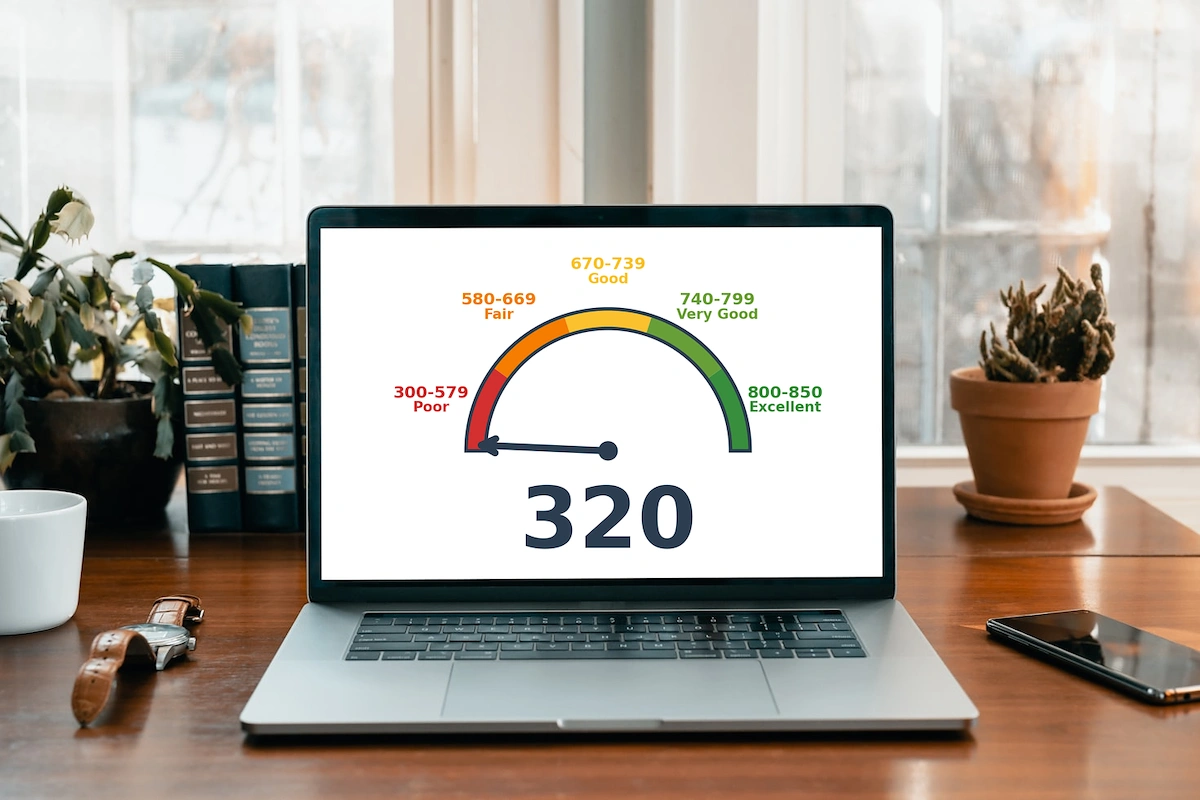
Kudos has partnered with CardRatings and Red Ventures for our coverage of credit card products. Kudos, CardRatings, and Red Ventures may receive a commission from card issuers. Kudos may receive commission from card issuers. Some of the card offers that appear on Kudos are from advertisers and may impact how and where card products appear on the site. Kudos tries to include as many card companies and offers as we are aware of, including offers from issuers that don't pay us, but we may not cover all card companies or all available card offers. You don't have to use our links, but we're grateful when you do!
320 Credit score: What You Need to Know in 2025
July 1, 2025


TL;DR
A 320 credit score offers a valuable starting point from which to build a stronger financial future. This score falls into the “Poor” FICO category, presenting a clear opportunity to improve your creditworthiness and access better financial products.
What Does a 320 Credit Score Mean?
A credit score of 320 places you at the lowest end of the standard FICO scoring range, which spans from 300 to 850. Lenders universally view this as a "very poor" score, signaling a high-risk borrower with a history of significant financial difficulties. Consequently, securing new lines of credit, such as loans or credit cards, will be exceptionally challenging. Any credit that is extended will almost certainly come with steep interest rates and restrictive terms, making borrowing very expensive.
While this score reflects serious credit challenges, it is not an unchangeable verdict on your financial future. It represents a starting point from which improvement is possible. Recognizing the gravity of the situation is the first step toward rebuilding your credit profile and working toward a healthier financial standing over time.
Who Has a 320 Credit Score?
Average credit scores tend to rise steadily with age. According to 2023 Experian data, the breakdown by generation is as follows:
- Generation Z (ages 18-26): 680
- Millennials (ages 27-42): 690
- Generation X (ages 43-58): 709
- Baby Boomers (ages 59-77): 745
- Silent Generation (ages 78+): 760
Credit Cards With a 320 Credit Score
A credit score of 320 is considered very poor and will significantly impact your ability to qualify for most credit cards. Lenders view this score as a high risk, meaning you're likely to face rejections for standard unsecured cards. Your options will generally be limited to products specifically designed for consumers with bad credit, such as secured credit cards that require a cash deposit.
With AI-powered tools that analyze your preferences and spending habits, Kudos delivers personalized credit card recommendations tailored to your unique financial situation. The platform also provides valuable insights into how applying for a new card might affect your credit score, helping you make a more informed decision.
Auto Loans and a 320 Credit Score
A 320 credit score places you in the deep subprime category, which can make securing an auto loan difficult, though not necessarily impossible. According to an analysis of 2025 auto loan rates, if you are approved, you can expect to face some of the highest interest rates available.
- Super-prime (781-850): 5.25% for new cars and 7.13% for used cars
- Prime (661-780): 6.87% for new cars and 9.36% for used cars
- Non-prime (601-660): 9.83% for new cars and 13.92% for used cars
- Subprime (501-600): 13.18% for new cars and 18.86% for used cars
- Deep subprime (300-500): 15.77% for new cars and 21.55% for used cars
Mortgages at a 320 Credit Score
A 320 credit score falls far below the minimum required for any standard home loan. Mortgage guidelines show that even the most lenient government-backed FHA loans require a score of at least 500. For borrowers with a 320 score, traditional financing options are essentially off the table, making qualification through a standard lender highly unlikely.
Even if you found a niche lender, the loan terms would be severe. Expect to face extremely high interest rates, a large down payment, and significant fees. Non-traditional routes like owner financing or rent-to-own may seem like an option, but they come with major risks and require careful consideration before you commit.
What's in a Credit Score?
Figuring out what goes into your credit score can feel like trying to solve a complex puzzle, but it generally boils down to a handful of key elements. The most common factors include:
- Your history of making payments on time is the most significant factor.
- How much of your available credit you're currently using, known as your credit utilization ratio, plays a major role.
- The age of your credit accounts, including the average age and the age of your oldest account, is also considered.
- Lenders like to see that you can responsibly manage different types of credit, such as credit cards and loans.
- Opening several new credit accounts in a short period can be seen as a risk and may temporarily lower your score.
How to Improve Your 320 Credit Score
While a 320 credit score can feel discouraging, it is absolutely possible to improve your creditworthiness with time and consistent effort. According to a guide from Kudos, taking specific, proven actions can help you build a healthier credit profile. Here are four steps you can take to begin raising your score:
- Monitor your credit reports. Checking your reports from all three bureaus allows you to spot and dispute any errors that might be dragging down your score. For a score in the 300s, removing even one inaccurate negative mark can provide a significant boost.
- Establish automatic bill payments. Your payment history is the single most important factor in your credit score, so paying bills on time is critical. Setting up automatic payments ensures you never miss a due date, which begins to build a positive track record to offset past issues.
- Apply for a secured credit card. A secured card is designed for those with damaged or limited credit and is easier to get approved for than a traditional card. Making small purchases and paying the bill on time demonstrates responsible credit use to lenders, which is essential for rebuilding your score.
- Become an authorized user. If you have a trusted friend or family member with a good credit history, ask to become an authorized user on their account. Their positive payment history and low credit utilization can be added to your credit file, helping to improve your score without you having to apply for new credit.
As you work to rebuild your credit, tools like the Kudos browser extension can help you manage your cards and find the best options for your financial situation.

Supercharge Your Credit Cards
Experience smarter spending with Kudos and unlock more from your credit cards. Earn $20.00 when you sign up for Kudos with "GET20" and make an eligible Kudos Boost purchase.
Editorial Disclosure: Opinions expressed here are those of Kudos alone, not those of any bank, credit card issuer, hotel, airline, or other entity. This content has not been reviewed, approved or otherwise endorsed by any of the entities included within the post.




























.webp)
.webp)
.webp)
.webp)
.webp)

.webp)
.webp)
%20(1).webp)
.webp)